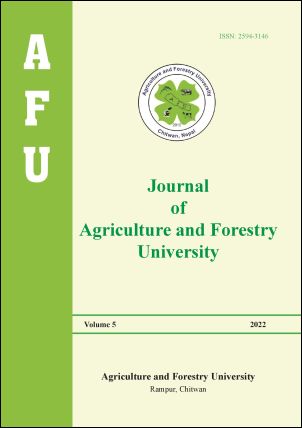Determinants for adoption of foundation rice seed production: Evidence from Kailali district of Nepal
DOI:
https://doi.org/10.3126/jafu.v5i1.48442Keywords:
Experience, logistic model, trainingAbstract
Rice seed production is an emerging agricultural enterprise to increase the income of farmers in Kailali. However, adoption of seed production technology is very limited in spite of its potential, which results in the poor supply of quality seed for its multiplication. Thus, this paper examines the influencing factors affecting farmers’ decision to adopt the foundation rice seed production in Kailali, Nepal. In total 158 households, 116 certified, and 42 foundation seed producers were selected using a stratified random sampling technique. The primary data were collected from September to November 2021. T-test, chi-square, and binary logistic model were applied for data analysis using SPSS. The result revealed that land size, experience, gender of household head, access to credit, training, extension contact, and type of family are statistically significant between two categories. Besides, the empirical result of logistic regression analysis indicated that out of twelve, six explanatory variables such as age, experience, training, extension contact, education, and type of family had significantly influence on adoption decision. Therefore, it is concluded the rice seed training programs and increasing the extension services would be beneficial to motivate the farmers for the production of foundation rice seed production.
Downloads
Downloads
Published
How to Cite
Issue
Section
License
Copyright (c) 2022 Agriculture and Forestry University (AFU), Rampur, Chitwan, Nepal

This work is licensed under a Creative Commons Attribution-NonCommercial 4.0 International License.
This license allows reusers to distribute, remix, adapt, and build upon the material in any medium or format for noncommercial purposes only, and only so long as attribution is given to the creator.




